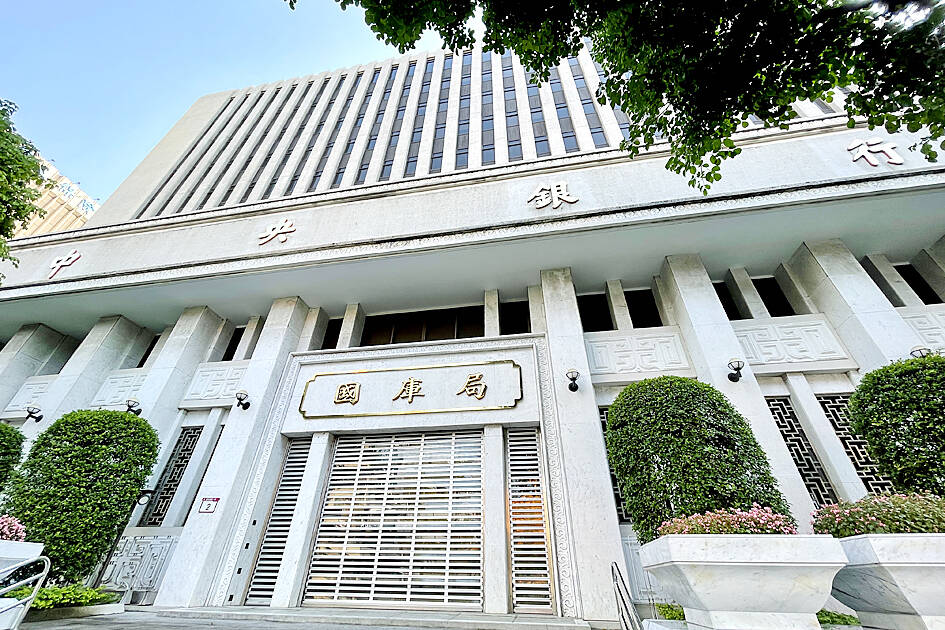The central bank would likely hike key interest rates by 12.5 basis points (bp) on Thursday amid slowing inflation, economists said.
The bank is expected to be less aggressive than the US Federal Reserve, as the inflation rate in Taiwan last month rose 2.66 percent, the lowest since February’s 2.33 percent, Taiwan Academy of Banking and Finance (台灣金融研訓院) economist Jerry Lin (林士傑) said.
Local consumer prices could further stabilize this year as the prices of industrial and agricultural goods decline on the global market, the Directorate-General of Budget, Accounting and Statistics has said.

Photo: George Tsorng, Taipei Times
The Fed is expected to raise key interest rates by 75 basis points following a Federal Open Market Committee meeting that is to end on Wednesday, Lin said.
The Fed’s continued hawkish approach is an attempt to quell skyrocketing inflation in the US, which reached 8.3 percent last month, beating market expectations of 8.1 percent growth, Lin said.
Lin said Taiwan’s central bank might take additional anti-inflationary measures, such as a 25-basis-point increase to the required deposit reserve ratio, which is the fraction of deposits regulators require banks to hold in reserves, and not lend.
At its June meeting, the central bank raised interest rates by 12.5 basis points, with a discount rate of 1.5 percent, and also hiked the required deposit reserve ratio by 25 basis points to reduce liquidity on the market.
Since starting a rate hike cycle in March, the Fed has raised interest rates by 225 basis points, while Taiwan’s central bank has only increased rates by 37.5 basis points.
Lin said if Taiwan’s inflation continues to moderate, the central bank might leave interest rates unchanged at a quarterly policymaking meeting in December.
However, a 12.5-basis-point hike would be possible in December if consumer prices continue to rise, he added.
Chung-Hua Institution for Economic Research (中華經濟研究院) vice president Wang Jiann-chyuan (王健全) said he also expects the central bank to raise rates by 12.5 basis points this week.
However, Wang added that the widening rate gap between Taiwan and the US could create problems for the local central bank by driving foreign funds out of Taiwan.
On Friday, continued fund outflows driven by expectations of an aggressive Fed hike boosted the US dollar, which rose NT$0.163 against the New Taiwan dollar to NT$31.293, its highest level since NT$31.365 recorded on Sept. 4, 2019.
Taiwan Institute of Economic Research (台灣經濟研究院) economist Wu Meng-tao (吳孟道) said Taiwan’s relatively small and export-orientated economy means the central bank is unlikely to act as aggressively as the Fed.
Fubon Financial Holding Co (富邦金控) chief economist Rick Lo (羅瑋) said the Fed is likely to raise rates by 50 basis points in November and 25 basis points in December following an expected 75-basis-point hike this month.
Lo said a December hike would signal the end of Fed’s rate hike cycle for this year, which would see it raise key interest rates by 375 basis points.
A more hawkish approach could hurt the US economy and have an adverse effect on other economies, Lo said.

Macronix International Co (旺宏), the world’s biggest NOR flash memory supplier, yesterday said it would spend NT$22 billion (US$699.1 million) on capacity expansion this year to increase its production of mid-to-low-density memory chips as the world’s major memorychip suppliers are phasing out the market. The company said its planned capital expenditures are about 11 times higher than the NT$1.8 billion it spent on new facilities and equipment last year. A majority of this year’s outlay would be allocated to step up capacity of multi-level cell (MLC) NAND flash memory chips, which are used in embedded multimedia cards (eMMC), a managed

CULPRITS: Factors that affected the slip included falling global crude oil prices, wait-and-see consumer attitudes due to US tariffs and a different Lunar New Year holiday schedule Taiwan’s retail sales ended a nine-year growth streak last year, slipping 0.2 percent from a year earlier as uncertainty over US tariff policies affected demand for durable goods, data released on Friday by the Ministry of Economic Affairs showed. Last year’s retail sales totaled NT$4.84 trillion (US$153.27 billion), down about NT$9.5 billion, or 0.2 percent, from 2024. Despite the decline, the figure was still the second-highest annual sales total on record. Ministry statistics department deputy head Chen Yu-fang (陳玉芳) said sales of cars, motorcycles and related products, which accounted for 17.4 percent of total retail rales last year, fell NT$68.1 billion, or

In the wake of strong global demand for AI applications, Taiwan’s export-oriented economy accelerated with the composite index of economic indicators flashing the first “red” light in December for one year, indicating the economy is in booming mode, the National Development Council (NDC) said yesterday. Moreover, the index of leading indicators, which gauges the potential state of the economy over the next six months, also moved higher in December amid growing optimism over the outlook, the NDC said. In December, the index of economic indicators rose one point from a month earlier to 38, at the lower end of the “red” light.

In Italy’s storied gold-making hubs, jewelers are reworking their designs to trim gold content as they race to blunt the effect of record prices and appeal to shoppers watching their budgets. Gold prices hit a record high on Thursday, surging near US$5,600 an ounce, more than double a year ago as geopolitical concerns and jitters over trade pushed investors toward the safe-haven asset. The rally is putting undue pressure on small artisans as they face mounting demands from customers, including international brands, to produce cheaper items, from signature pieces to wedding rings, according to interviews with four independent jewelers in Italy’s main